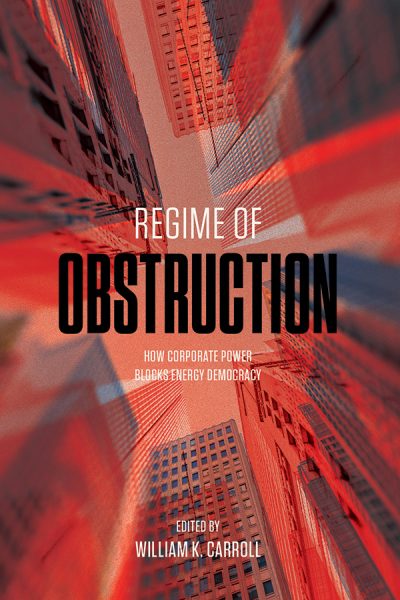Political Economy of Workplace Injury in Canada
Bob Barnetson

Subjects: Business and Economics, Political Science
Imprint: AU Press
Rapidly rising carbon emissions from the intense development of Western Canada’s fossil fuels continue to aggravate the global climate emergency and destabilize democratic structures. The urgency of the situation demands not only scholarly understanding, but effective action.
Regime of Obstruction aims to make visible the complex connections between corporate power and the extraction and use of carbon energy. Edited by William Carroll, this rigorous collection presents research findings from the first three years of the seven-year, SSHRC-funded partnership, the Corporate Mapping Project. Anchored in sociological and political theory, this comprehensive volume provides hard data and empirical research that traces the power and influence of the fossil fuel industry through economics, politics, media, and higher education. Contributors demonstrate how corporations secure popular consent, and coopt, disorganize, or marginalize dissenting perspectives to position the fossil fuel industry as a national public good. They also investigate the difficult position of Indigenous communities who, while suffering the worst environmental and health impacts from carbon extraction, must fight for their land or participate in fossil capitalism to secure income and jobs. The volume concludes with a look at emergent forms of activism and resistance, spurred by the fact that a just energy transition is still feasible. This book provides essential context to the climate crisis and will transform discussions of energy democracy.
Contributions by Laurie Adkin, Angele Alook, Clifford Atleo, Emilia Belliveau-Thompson, John Bermingham, Paul Bowles, Gwendolyn Blue, Shannon Daub, Jessica Dempsey, Emily Eaton, Chuka Ejeckam, Simon Enoch, Nick Graham, Shane Gunster, Mark Hudson, Jouke Huizer, Ian Hussey, Emma Jackson, Michael Lang, James Lawson, Marc Lee, Fiona MacPhail, Alicia Massie, Kevin McCartney, Bob Neubauer, Eric Pineault, Lise Margaux Rajewicz, James Rowe, JP Sapinsky, Karena Shaw, and Zoe Yunker.
A remarkable volume that puts on display an impressive amount of empirical research—robust, rigorous, and multifaceted. The Corporate Mapping Project has clearly produced the kind of hard data on ownership structures and operations of capitalist class fractions that make it possible to see how power is actually wielded in the economy—and this is a rarity. Regime of Obstruction is a most important contribution to research and activism in the field of fossil fuels and climate change.
Andreas Malm, author of Fossil Capital
This exceptional collection has the data and theoretical analysis to lay bare a reality we too often ignore: the real climate culprits are the industries who own, control, and profit from fossil fuels.
Matthew T. Huber, author of Lifeblood: Oil, Freedom, and the Forces of Capital
Regime of Obstruction offers a powerful critique of the hegemony of fossil capital in the economic, political, and cultural spheres of contemporary Canada. […] This collection constitutes an important contribution to the growing body of critical scholarship about energy transition and is a fascinating read.
Sibo Chen, Canadian Journal of Communication
At a time when corporate concentration is at dangerous levels, and multi-billionaires pad their wealth while the globe burns with inequality and environmental disasters, the research in this book is badly needed. It gives an indication of what we’re up against in our transition to sustainable democracy.
Kevin Taft, Alberta Views
Regime of Obstruction documents the corruption of Canadian democracy that has become characteristic of our governmental systems, corporate regimes, and even the environmental organizations that have collaborated in the greening of the business ethos.
Loys Maingon, The BC Review
This work is licensed under a Creative Commons License (CC BY-NC-ND 4.0). It may be reproduced for non-commercial purposes, provided that the original author is credited.